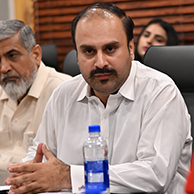Good Governance, Challenges and Recommendations: Case of Pakistan

Introduction
The concept of governance is very old as it has ancient origins, dating back to the early stages of human civilization. Its linguistic roots can be traced to the Greek term "kybernan," that means to regulate, control or steering of a boat. Latin word "gubernare," was used by Roman to adopt the same concept that comprises the idea of directing, guiding and ruling. The meaning of governance has evolved with the passage of time.
At its core, governance encompasses intricate processes of decision-making and subsequent execution. Its scope extends across various realms such as politics, finance, and authority, involving specialists operating in both private and public sectors. These experts address national concerns at every level, aiming to improve the overall welfare of the country's populace.
This article aims to offer a comprehensive understanding of good governance and its defining characteristics. Additionally, it will briefly point out challenges that hinder the implementation of good governance in Pakistan and provide suggestions for embracing and promoting effective governance practices.
Good Governance
Good governance is the establishment of favourable political framework responsible for economic, social, ecological, market oriented developments, utilization of public resources and efficient use of political power by state. It plays a crucial role in fostering human development and alleviating poverty. These objectives can be realized through the establishment of a competent public sector guided by principles such as participation, public accountability, transparency, and ownership. Good governance ensures the transparent and responsible management of public resources, tackling corruption and directing these resources toward the collective well-being of all citizens while safeguarding their fundamental rights.
Characteristics of Good Governance
Based on the aforementioned definitions, the key criteria for good governance include the government's commitment to being participatory, consensus-oriented, accountable, transparent, and efficient. Additionally, it should uphold principles of equity and inclusivity while adhering to the supremacy of law.
- Consensus Oriented:
Within society, diverse stakeholders coexist, and for effective governance, it is essential to mediate conflicts of interest among these various groups. It becomes the government's duty to facilitate consensus-oriented decision-making.
- Accountability:
Accountability stands as a fundamental pillar of good governance, representing the government's responsibility to those it governs and the means by which individuals can exert their influence on the government. It is the mechanism through which a person or group can be held responsible for their actions. Typically, accountability is applied to the political and civil executive, comprising public officers who are answerable to the citizens.
- Transparency:
It is an essential element of good governance. transparency is the provision that enables individuals to understand the decision-making process of the government.
- Efficiency:
Within the framework of good governance, the concept of efficiency extends to the sustainable utilization of natural resources and the preservation of the environment. Good governance entails that processes and institutions yield outcomes that fulfill the societal needs while optimizing the use of available resources.
- Supremacy of law:
Across political consensus, there is a widespread acknowledgment that the supremacy of law forms an essential foundation for endeavors to attain the objective of good governance. Justice holds a central position in governance, prioritizing it as the utmost importance in establishing a fair society where individuals from diverse backgrounds and faiths can coexist peacefully and harmoniously, devoid of discrimination.
Governance issues in Pakistan
Many Professional experts, policymakers, and economists emphasize that good governance play an important role in achieving sustainable economic growth in the country. However, the current state of Pakistan is concerning, facing significant threats from both foreign and internal forces that directly or indirectly disrupt the processes of good governance. Besides active involvement in the war against terrorism, the nation grapples with crises in energy, food, and unemployment, further exacerbated by the deterioration of key sectors such as education, health, and industry.
Political instability has had adverse consequences on Pakistan's growth and development, with frequent changes in the democratic system due to martial law or premature dissolution of the assembly. Transitions from democracy to military rule create challenging situations, impacting the implementation of executive reforms. Successive governments often overturn executive reforms initiated by opposition parties, contributing to delays, injustice, and mismanagement of resources.
Effective and timely decision-making, along with efficient implementation, is a hallmark of good governance. In contrast, practices like nepotism, a rigid mindset, and procedural delays signify inadequate or bad governance, fostering corruption that pervades various sectors in Pakistan.
Highlighting Major problems in Pakistan
- Corruption:
Corruption poses a significant hurdle to the effective implementation of good governance in Pakistan, spread nearly in every institution of the country. The prevalence of bribery is particularly evident in law enforcement agencies, recruitment processes, and the delivery and procurement of public services. Transparency International's recent survey highlights the police force as the most corrupt institution in Pakistan, followed by contracting and tendering. The judiciary ranks third among the top corrupt institutions, underscoring the pervasive nature of corruption in various sectors of the country.
- Nepotism:
Nepotism is characterized by the inappropriate exercise of authority to favor family members and friends, appointing them to positions without regard for merit. In Pakistan, such practices are widespread and pose a significant obstacle to enhancing human development. Despite a youth population exceeding 60%, there is a consistent decline in the social development index, primarily attributed to the preferential treatment given by governing bodies to their relatives and close associates. This practice elevates unqualified individuals to higher positions, leaving deserving candidates relegated to average posts and contributing to societal disparities.
- Political Instability:
Pakistan grapples with a significant challenge in the form of political instability, which gives rise to a frail government and a weakened political framework, consequently impeding economic growth and development. The repercussions of political instability extend to economic crises, social turmoil, and a decline in both security and peace, creating a precarious situation within the country.
- Weak Judicial System:
In order to establish good governance and foster a welfare state, a robust and accountable judicial system is essential for the timely provision of justice. Unfortunately, Pakistan's current judicial system is weak and riddled with loopholes, like fake legal cases and long-term prosecution procedure. These factors contribute to delays in the swift delivery of justice and the imposition of penalties on criminals. Additionally, incompetency of criminal investigators, provides an escape route to criminals in courts due to lack of evidences against them.
- War against Terrorism:
Pakistan has been engaged in a protracted struggle against terrorism, incurring substantial costs in terms of lives lost, economic setbacks, and internal civil unrest. This prolonged conflict has not only inflicted damage on the country's economy but has also served as a significant impediment to the establishment of good governance, owing to persistent internal instability.
Recommendations for Good Governance in Pakistan
Corruption is not only unique to Pakistan; other nations grappling with similar challenges can draw lessons from Pakistan's experience to formulate more effective anti-corruption policies. The following recommendations aim to enhance good governance in Pakistan:
- Establishment of an independent oversight entity to monitor anti-corruption commissions and courts is crucial for combating corruption within the nation. Anti-corruption laws must be stringent, and severe penalties should be imposed on individuals engaging in corrupt practices to deter any inclination towards corruption.
- Strengthening governmental institutions is crucial, emphasizing the importance of empowering institutions rather than individuals, while still involving individuals in sustainable development efforts.
- Leaders and stakeholders in Pakistan need to unite and engage in negotiations to formulate policies exclusively aimed at the benefit, prosperity, and growth of the country. The implementation of long-term policies spanning 15-20 years is essential for attaining sustainable growth. State departments in Pakistan should guarantee the continuity of these policies, irrespective of changes in government, to ensure the realization of desired outcomes.
- Practices like Nepotism should be discouraged through transparent system and recruitment on merit basis. Vigilant monitoring of the recruitment process is essential to prevent bribery and corrupt practices, ensuring the transparent selection of qualified personnel.
- The eradication of political instability necessitates mutual understanding and equal importance among all political parties. Ensuring free and fair elections as per constitution of Pakistan is crucial to preventing political instability, and whoever emerges victorious in the electoral process should be allowed to complete their term in governance.
- Reforming the judicial system to expedite case prosecution is imperative. To deter practices such as corruption and political interference, there should be stringent monitoring and evaluation of the judicial process. The implementation of e-courts can help reduce economic costs and the need for physical appearances in court. A judicial commission, comprising legal experts, retired judges, and professionals from the legal field and civil society, should be established to make reforms in the judicial system.
- Pakistan armed forces are playing their best role in eradication of terrorism but to effectively address terrorism, it is crucial for other law enforcement agencies to establish a robust and efficient coordination mechanism, and play their role in ensuring swift and proactive responses to terrorist activities.
Conclusion
The concept of governance, with its ancient roots and evolution, underscores the crucial importance of good governance for the well-being of societies. Pakistan, like many nations, faces challenges in achieving and maintaining good governance, with internal and external threats contributing to issues in various sectors.
The identified governance issues in Pakistan, including political instability, transitions between democratic and military rule, and widespread corruption, highlight the need for comprehensive reforms. Recommendations focusing on strengthening institutions, decentralization, strategic recruitment, and sustainable development, offer pathways for improvement.
Since gaining independence, Pakistan has encountered numerous challenges and surmounting many through persistent struggle and sacrifices. The safeguarding, growth, and prosperity of Pakistan are our responsibilities that we must fulfill. Drawing lessons from past experiences and putting into practice the recommended measures, Pakistan can strive towards establishing a more transparent, accountable, and efficient governance framework. Through persistent endeavors and the application of good governance principles, our society can foster sustainable development, reduce poverty, and enhance the overall welfare of the nation's people.
His strategic vision and unwavering commitment to excellence have been instrumental in driving our company's growth and success. Zaildar Ahsan shah is not only a visionary leader but also a dedicated advocate for our team, fostering a culture of innovation, collaboration, and continuous improvement. Under his guidance, our company has not only met but exceeded its goals, positioning us as a market leader in Elaan Research centre.







